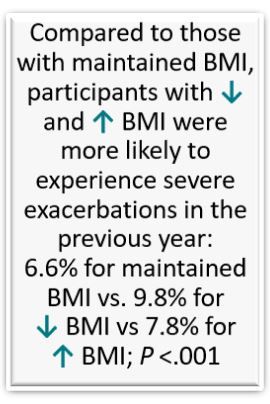- Clinical Technology
- Adult Immunization
- Hepatology
- Pediatric Immunization
- Screening
- Psychiatry
- Allergy
- Women's Health
- Cardiology
- Pediatrics
- Dermatology
- Endocrinology
- Pain Management
- Gastroenterology
- Infectious Disease
- Obesity Medicine
- Rheumatology
- Nephrology
- Neurology
- Pulmonology
Decrease in BMI Linked to Increased Risk for Severe Exacerbations, All-Cause Mortality in COPD
Among persons with COPD whose BMI decreased over a 4-year follow-up, mortality risk rose 70% compared with those whose BMI remained the same, researchers reported.
In individuals with chronic obstructive pulmonary disease (COPD) a decrease in body mass index (BMI) over time was associated with a significant increase in risk of severe COPD exacerbation and of all-cause mortality, according to new research from Korean investigators. The relationship with all-cause mortality was most significant and was dose dependent among study participants who were underweight.
©missbobbit/stock.adobe.com

Writing in the journal Respiratory Research, first author Taeyun Kim, division of pulmonary an critical care medicine, Kosin University College of Medicine, Busan, Republic of Korea, and colleagues also reported that a correlation between increased BMI and increased mortality risk was observed only among study participants with obesity at baseline. The results, they said, highlight the importance of monitoring BMI for the nonpharmacologic management of COPD and also to support outcome prediction.
Low BMI in persons with COPD has long been associated with poor outcomes, Kim et al explained, but research on obesity and health in people with COPD has delivered conflicting outcomes with some studies suggesting a protective role and others showing an increase in mortality. What the authors say is missing from evidence on the relationship is the effect of longitudinal change in BMI on COPD outcomes, which became the objective for the current study.
Researchers used data from a large nationally representative cohort drawn from the Korean National Health Insurance System (K-NHIS) that covers the entire South Korean population. Eligible participants were aged 40 years and older with a diagnosis of COPD between January 1, 2014, and December 31, 2019, and had data for at least 2 health examinations – 1 within 2 years before (examination 1) and another within 3 years after the diagnosis (baseline, examination 2). K-NHIS derives data from the standardized national health screening program that provides biannual examinations for all insured individuals and collects information on lifestyle, medical history, anthropometric measures, and laboratory findings.
Kim and colleagues classified eligible study participants according to Asian-specific BMI criteria as underweight (BMI <18.5 kg/m2); normal weight (BMI 18.5-22.9 kg/m2); overweight ( BMI 23-24.9 kg/m2); and obese (BMI ≥ 25 kg/m2). After calculating the percentage of BMI change (difference in BMI between examinations 1 and 2) for all participants, researchers classified them into 3 groups: decrease in BMI over 5%, increase in BMI over 5%, and no change in BMI (not more than 5%). The primary endpoint was all-cause mortality with events recorded after examination 2. The secondary endpoint was initial severe exacerbation after examination 2.
FINDINGS
The final cohort numbered 116 463, had a median age of 67 years, and was two-thirds (66%) men. Following a diagnosis of COPD, 14 728 (12.6%) participants experienced a greater than 5% decrease in BMI; 80 689 participants (69.2%) maintained BMI; and 21 046 (18.1%) experienced an increase of more than 5%.
Analyzed according to baseline BMI, 31.5% of participants who were underweight had an increase in BMI of more than 5% and 14% of those with obesity had a decrease in BMI of less than 5%.
Mortality
Kim et al reported 8412 deaths during a median follow-up of 3.9 years from the index date. Compared with participants whose BMI remained the same, there was a 70% increased risk of mortality among those who had a decrease in BMI (aHR 1.70; 95% CI, 1.61-1.79) compared with a 13% greater risk in the group who experienced an increase in BMI (aHR 1.13; 95% CI, 1.07-1.20).

When they analyzed subgroups according to BMI before COPD diagnosis, the team observed an increase in mortality for the group whose BMI decreased regardless of mean BMI before COPD diagnosis, with rates per 100-person years (PY) of 8.1, 4.6, 3.2, and 2.2 for patients who were underweight, normal weight, overweight, and obese, respectively. Among those who experienced an increase in BMI, mortality rates per 100-PY were much lower, at 3.7, 2.1, 1.3, and 1.3 for patients who were underweight, normal weight, overweight, and obese before COPD diagnosis, respectively.
Exacerbations
During the approximately 4-year follow-up period, 16 565 participants experienced severe COPD exacerbations. Kim and colleagues reported incidence per 100 PY for the BMI maintenance group of 4.1; for the group experiencing a decrease in BMI of 6.0; and for those with an increase in BMI of 4.8 (P < .01). When researchers compared the subgroup with a decrease in BMI of more than 5% vs the BMI maintenance group the aHR was 1.30 (95% CI, 1.24-1.35). Comparison of the group with a BMI increase of more than 5% vs the maintenance group returned an aHR of 1.12 (95% CI, 1.07-1.16).
Among the study's limitations the authors note that COPD definition was based on claims data and diagnostic codes since lung function data are not available in the KNHIS database, creating potential for misclassification bias. Other limitations were that potential confounders may have not been fully covered and contributed to the severe outcomes and reasons for change in BMI were unknown.
"Regular monitoring for weight loss might be an important component for COPD management" and would "enable clinicians to guide patients to make appropriate lifestyle modifications," the authors concluded.
